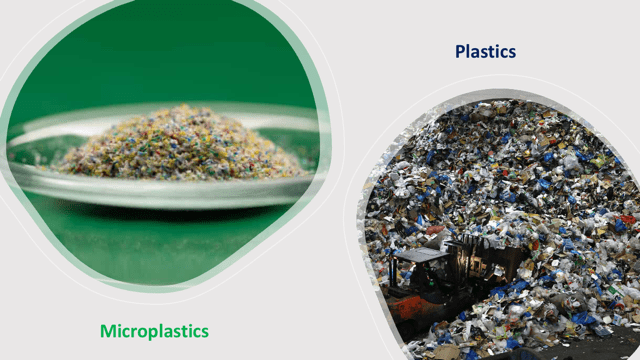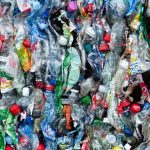Plastics due to its versatility of use are popular throughout the world. They are employed in various uses e.g. food packaging, clothes, water pipes, tyres, footwear, and a host of other uses. There is hardly anywhere you could turn at home without seeing something made from plastics.
The Norwegian Research Council has listed more than 16,000 chemicals associated with plastics. Of these, more than 4,000 chemicals are classified as “chemicals of concern”, and of these classified chemicals, slightly less than a thousand are regulated by global efforts. Some of these chemicals of concern are also of environmental concern as they leach into water, food and the environment.
Join our WhatsApp ChannelPlastics contain additives such as PFCs (perfluoroalkyl compounds), which are a class of organic molecules that are used in a variety of products such as oil and water repellents, coatings for cookware, carpets, and textiles. Perfluoroalkyl compounds have endocrine-disrupting properties on human reproductive health, including low semen quality and male sterility.
In the circular economy, because plastic waste is of little or no value at all, only about 9% plastic waste is recycled. This means that there are tons of plastic waste polluting the environment, in fact, as much as 85% of marine debris is of plastic waste.
Microplastics and nanoplastics are tiny particles shed into the environment by plastics, and because these microplastics (less than 5 mm in length) and nanoplastics (less than 1000 nm long) are so tiny, they can easily be ingested in food, drink or inhaled, in fact, they have been found in breast milk, blood, lungs, placenta and in shellfish.
These micro-and nanoplastics, for ease of discussion herein after referred to by the generic name of microplastics, are worrying contaminants, not only because they last very long in the environment, but also, because they accumulate in the body due to the inability of the body to degrade them. But in general, accumulation of microplastics in the body is not always a health issue, that is, until now. A new study published in the March issue of The New England Journal of Medicine has raised the alarm of a potential risk factor for cardiovascular disease posed by microplastics.
Due to the attraction of microplastics to fat molecules in the body, a greater amount of fat is digested and absorbed into the body, increasing the risk of fat-associated diseases such as obesity and cardiovascular disease.
Italian researchers led by Dr Giuseppe Paoliss enrolled 304 patients undergoing a surgical procedure called carotid endarterectomy aimed at reducing the risk of stroke by removing fatty deposits or plaques that can accumulate on the lining of the carotid arteries. These carotid arteries (comprising of a pair of right- and left-internal carotid arteries, and right- and left-external carotid arteries), are located on each side of the neck. The external and internal carotid arteries are the main blood vessels delivering oxygenated blood from the heart to the head and brain, respectively. Of the initial 304 patients enrolled in the study, 257 were tracked for almost 3 years in order to determine if there were accumulation of microplastics in the fat-rich plaques lining their arteries.
The study revealed that plaque samples from 150 of the patients had microplastics imbedded with cells and other waste products. Analysis of these microplastics showed that they were composed of either polyethylene, which is popularly used to package foods and in making shopping bags and medical tubings, or polyvinyl chloride (PVC) ie vinyl, used in both industrial and consumer products such as electronics, roofing, flooring, etc.
The study revealed that patients with microplastics detected in the plaques lining their carotid artery had a higher risk of cardiovascular disease, stroke, or death from any other cause 34 months following the surgery than those in whom microplastics were not found in their plaque samples.
It is known that microplastics cause skin damage, and initiate inflammation in lung cells. Therefore, it was not surprising that the study also discovered that participants with microplastics seen in their plaque samples had higher levels of biomarkers for inflammation. The fear is that if the body does recognise microplastics as foreign and trigger inflammatory response that ruptures the plaques, the fatty deposits contained in the plaques might clog blood vessels resulting in life threatening health issues such as stroke or heart attack.
In March of 2022, exactly two years ago, 175 countries voted in Nairobi, Kenya, to create a legally binding international plastics treaty by the end of 2024. The treaty amongst other things, called for the adoption of action plans at all levels geared towards preventing, reducing and eliminating plastic pollution. The UN Secretary-General, António Guterres, called the initiative, “The most important deal since the Paris Agreement.”
But this enthusiasm was dampened six months later by the worst environmental terrorism in modern history, which occurred on 26 September 2022 when in the twinkling of an eye, the Nord stream pipelines belonging to Russia and Germany were sabotaged and destroyed, spewing thousands of tonnes of methane gas into the environment equivalent to the total annual emissions of more than two million gasoline cars! This level of shortsighted environmental terrorism negates all the efforts made in the past at environmental protection, and it is doubtful if anybody would ever seriously consider making further efforts aimed at protecting the environment.
This doubt is further reinforced by the fact that if for every spat between countries, the environment becomes a target, then there are no incentives to expend so much energy and resources protecting something that can be wilfully destroyed with no consequences incurred by anyone.





![Relishing Ugba [Oil Bean] Delicacy](https://www.primebusiness.africa/wp-content/uploads/2025/06/Ugba-delicacy-720x480.jpg)













Follow Us